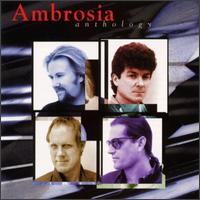 Casual
observers might place Ambrosia alongside
frothy denizens of the 70's hit parade like ABBA or ELO. Indeed, Ambrosia is
best remembered for such relatively lightweight concoctions as "How Much
I Feel" and "Biggest Part Of Me." In fact, however, they were
a fairly progressive group of very accomplished musicians (including guitarist,
vocalist, and songwriter David
Pack), and their legacy
extends far beyond the Top 40. Discovered in 1971 by Los Angeles Philharmonic
conductor
Zubin
Mehta,
the
group
went on
to produce five albums for Warner Brothers from 1975 to 1982, all of which
will appeal to prog rock fans with a sweet tooth for pop.
Casual
observers might place Ambrosia alongside
frothy denizens of the 70's hit parade like ABBA or ELO. Indeed, Ambrosia is
best remembered for such relatively lightweight concoctions as "How Much
I Feel" and "Biggest Part Of Me." In fact, however, they were
a fairly progressive group of very accomplished musicians (including guitarist,
vocalist, and songwriter David
Pack), and their legacy
extends far beyond the Top 40. Discovered in 1971 by Los Angeles Philharmonic
conductor
Zubin
Mehta,
the
group
went on
to produce five albums for Warner Brothers from 1975 to 1982, all of which
will appeal to prog rock fans with a sweet tooth for pop.
Working with svengali Alan Parsons, Ambrosia created their most ambitious
music on their first two albums, Ambrosia and Somewhere
I've Never Travelled. The magnificent orchestral arrangements and dense,
fusion-oriented rockers put them nearly in the same league as Yes or Genesis.
However, their next two albums, Life
Beyond L.A. and One-Eighty (both
self-produced) featured a slicker, lighter sound and yielded their biggest
hits. Ambrosia's singles were always a cut above similar 70's fodder, though
- England Dan & John Ford Coley, they ain't. Their final record, Road
Island, was produced by James Guthrie (Judas Priest) and revisited their
earlier style while adding heavier rock tones; it achieved predictably lackluster
sales.
All of those records were reissued on CD a few years back, starting with a
generally excellent retrospective Anthology (later
reisued as Greatest
Hits), encompassing five chart hits, several key album
tracks, and three new songs. Fans will appreciate the fresh material, but,
personally,
I would
gladly
trade
it in favor of "Magical Mystery Tour." This song (a Top 40 hit in
1977) was featured in the unusual film, All
This And World War II,
which set documentary war footage against a soundtrack of Beatles covers. Can't
have it all, I suppose. [top of page]